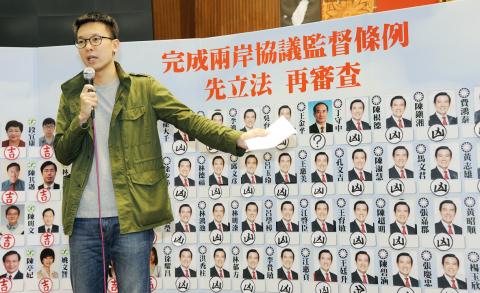|
Ma administration unveils bill to oversee China pacts
FITS THE BILL? The Cabinet said the bill heeded protesters’ calls for a mechanism to monitor cross-strait deals, but that the service pact they want it to apply to is exempt
By Stacy Hsu / Staff writer, with CNA

Student leader Lin Fei-fan yesterday points to the portion of a board on which the Chinese Nationalist Party’s (KMT) legislators are listed, urging them to sign a letter of commitment to meet the protesters’ demands. An image of President Ma Ying-jeou has been placed over each of the KMT lawmakers’ faces. If they agree to sign the letter, the character for “ominous” next to their name will be changed to “auspicious.”
Photo: Liu Hsin-de, Taipei Times
The President Ma Ying-jeou (馬英九) administration yesterday unveiled a draft bill on establishing an oversight mechanism for bilateral agreements with China, as students opposing the cross-strait service trade pact have been demanding, but stressed that it would have no implication for the controversial service deal.
The student-led activists against the service sector liberalization are also demanding that the Executive Yuan withdraw the trade pact from the legislature and suspend its legislative review until the mechanism is up and running.
Four days after Ma expressed his support for the protesters’ demand that the supervision of cross-strait agreements be institutionalized at an international press conference on Mar. 29, Mainland Affairs Council Deputy Minister Chang Hsien-yao (張顯耀) briefed members of the Chinese Nationalist Party’s (KMT) Central Standing Committee on the details of the draft legislation to set up the monitoring mechanism.
The draft legislation combines the four-stage communication guidelines that the ruling party proposed in February to bolster legislative supervision of cross-strait treaties with a two-stage national security screening mechanism established by the council in January.
The bill is due to be discussed at a Cabinet meeting today.
The communication guidelines would require the Executive Yuan to brief the legislative speaker and deputy speaker, all legislative caucuses, as well as any relevant legislative committees, on the proposed contents of a cross-strait agreement during the issue formation stage, the first of four phases.
In the second stage, the communication phase, the legislature would be routinely updated on the progress of negotiations, while in the third, pre-signing phase, the Executive Yuan would have to brief lawmakers on the important details of the accord, its potential benefits and the ways in which it is to be enacted.
Finally, the post-signing phase would see the Executive Yuan providing the legislature with special reports on the achievements of the cross-strait agreement upon request.
Meanwhile, the national security screening mechanism would require pending cross-strait pacts to be sent to the Cabinet for review first before being “assessed thoroughly” by a group of academics selected by the National Security Council to ensure that they would not negatively impact society, national defense and security through their views.
“The bill is part of the government’s effort to promote transparent cross-strait negotiations and to respond positively to the public’s call for the institutionalization of a mechanism to monitor future cross-strait pacts,” Executive Yuan spokesman Sun Lih-chyun (孫立群) said.
However, Sun added that the bill would “have no bearing” on the service trade pact with China, a stance in accordance with Ma’s repeated insistence that the agreement be exempt from the retroactive application of any future laws enacted to monitor cross-strait treaties.
There are two main differences between the Cabinet’s version of the bill and that drawn up by the Democratic Front Against Cross-Strait Trade in Services Agreement — the one favored by the student-led demonstrators who have been occupying the legislature since Mar. 18 to try and block the service trade pact.
The first difference is that the civic group’s version would entitle the legislature to revise and add new articles to the proposed contents of a cross-strait agreement during the pre-negotiation phase.
Second, during the pre-signing stage, civic groups would be allowed to conduct their own impact assessment reports on proposed bilateral agreements.
If their conclusions differ significantly from those reached by the Cabinet, the legislature would then have the right to demand the government renegotiate the pact.
A third discrepancy between the two versions was resolved when the government last night agreed to the stipulations in the group’s proposal that a cross-strait agreement can be revised after it is signed and that it will renegotiate terms with Beijing if the legislature fails to ratify a pact.
source: Taipei Times
|